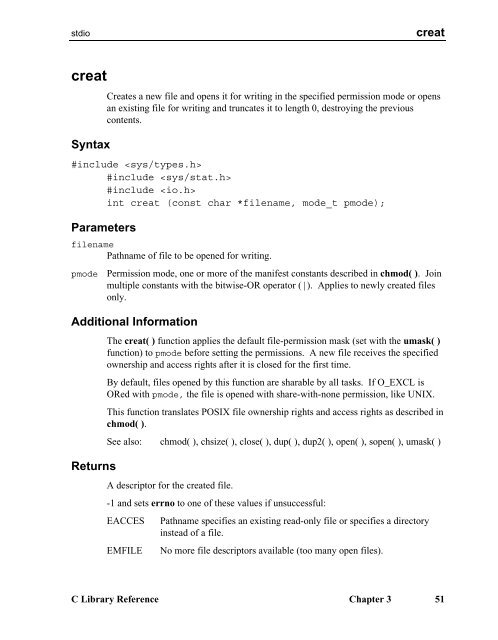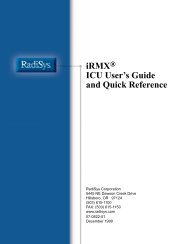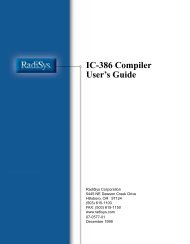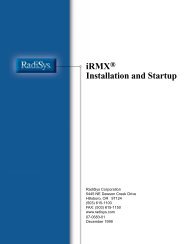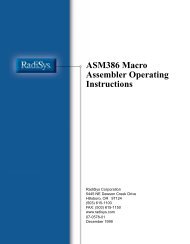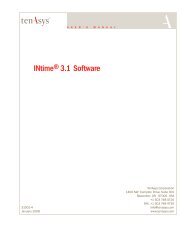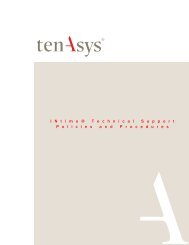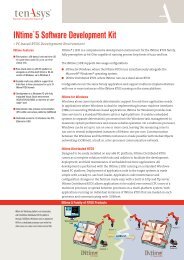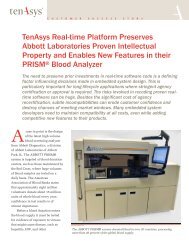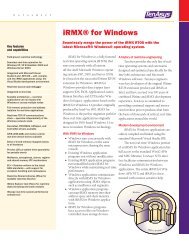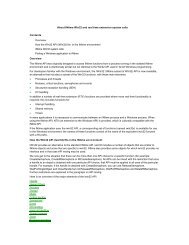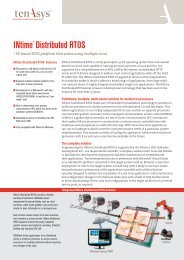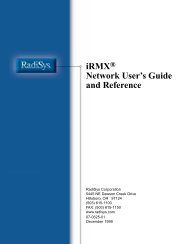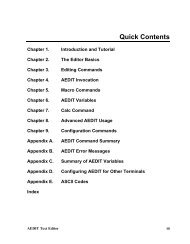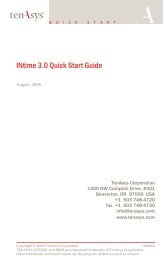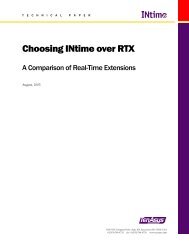- Page 1 and 2:
iRMX ® C Library Reference RadiSys
- Page 3 and 4:
Chapter 1. Introduction Chapter 2.
- Page 5:
Related Publications For additional
- Page 8 and 9:
3 Functions abort..................
- Page 10 and 11:
getenv ............................
- Page 12 and 13:
strcat ............................
- Page 14 and 15: xiv Contents
- Page 16 and 17: You link each application to a smal
- Page 18 and 19: Table 1-1 lists functions which are
- Page 20 and 21: Support for Development Tools You c
- Page 22 and 23: File information functions, macros,
- Page 24 and 25: Control Functions These functions c
- Page 26 and 27: DOS Console I/O Functions These fun
- Page 28 and 29: fflush Flushes a buffered stream (h
- Page 30 and 31: _get_rmx_conn Translates a file des
- Page 32 and 33: Memory Functions These functions co
- Page 34 and 35: strncpy Copies the specified number
- Page 36 and 37: 22 Chapter 2 Functional Groupings
- Page 38 and 39: abort ANSI abort Syntax Aborts the
- Page 40 and 41: acos ANSI acos Syntax Calculates th
- Page 42 and 43: asin ANSI asin Syntax Calculates th
- Page 44 and 45: atan, atan2 ANSI atan, atan2 Syntax
- Page 46 and 47: atof, atoi, atol ANSI atof, atoi, a
- Page 48 and 49: Bessel Functions Bessel Functions S
- Page 50 and 51: search ANSI Returns A pointer to th
- Page 52 and 53: calloc ANSI calloc Syntax Allocates
- Page 54 and 55: cgets DOS cgets Syntax Gets a chara
- Page 56 and 57: chmod Returns This function transla
- Page 58 and 59: clearerr ANSI, stdio clearerr Synta
- Page 60 and 61: close ANSI close Syntax Closes a fi
- Page 62 and 63: cos, cosh ANSI cos, cosh Syntax Cos
- Page 66 and 67: creat stdio ENOENT Pathname not fou
- Page 68 and 69: _cstop _cstop Syntax Deletes the C
- Page 70 and 71: cstr, udistr cstr, udistr Syntax Cs
- Page 72 and 73: difftime ANSI difftime Syntax Finds
- Page 74 and 75: _dos_allocmem DOS _dos_allocmem Syn
- Page 76 and 77: _dos_creat, _dos_creatnew DOS _dos_
- Page 78 and 79: _dos_findfirst, _dos_findnext DOS _
- Page 80 and 81: _dos_freemem DOS _dos_freemem Synta
- Page 82 and 83: _dos_getftime DOS _dos_getftime Syn
- Page 84 and 85: _dos_open DOS _dos_open Syntax Open
- Page 86 and 87: _dos_read DOS _dos_read Syntax Read
- Page 88 and 89: _dos_setdate DOS _dos_setdate Synta
- Page 90 and 91: _dos_settime DOS _dos_settime Synta
- Page 92 and 93: dup, dup2 stdio dup, dup2 Syntax Du
- Page 94 and 95: eof stdio eof Syntax Checks whether
- Page 96 and 97: exp ANSI exp Syntax Calculates the
- Page 98 and 99: fclose, fcloseall ANSI, stdio fclos
- Page 100 and 101: fdopen stdio fdopen Syntax Opens a
- Page 102 and 103: feof ANSI, stdio feof Syntax Tests
- Page 104 and 105: fflush ANSI, stdio fflush Syntax Fl
- Page 106 and 107: fgetpos ANSI, stdio fgetpos Syntax
- Page 108 and 109: filelength stdio filelength Syntax
- Page 110 and 111: floor ANSI floor Syntax Calculates
- Page 112 and 113: fmod ANSI fmod Syntax Calculates th
- Page 114 and 115:
fprintf ANSI, stdio fprintf Syntax
- Page 116 and 117:
fputs ANSI, stdio fputs Syntax Writ
- Page 118 and 119:
free ANSI free Syntax Deallocates a
- Page 120 and 121:
frexp ANSI frexp Syntax Gets the ma
- Page 122 and 123:
fseek ANSI, stdio fseek Syntax Move
- Page 124 and 125:
fsetpos ANSI, stdio fsetpos Syntax
- Page 126 and 127:
ftell ANSI, stdio ftell Syntax Gets
- Page 128 and 129:
fwrite ANSI, stdio fwrite Syntax Wr
- Page 130 and 131:
_get_arguments _get_arguments Synta
- Page 132 and 133:
getc, getchar ANSI, stdio getc, get
- Page 134 and 135:
getenv ANSI, stdio getenv Syntax Se
- Page 136 and 137:
_get_ds _get_ds Syntax Returns an a
- Page 138 and 139:
_get_info _get_info Syntax Obtains
- Page 140 and 141:
getopt stdio getopt Syntax Gets the
- Page 142 and 143:
_get_rmx_conn stdio _get_rmx_conn S
- Page 144 and 145:
getw stdio getw Syntax Reads the ne
- Page 146 and 147:
is Functions ANSI is Functions Synt
- Page 148 and 149:
isatty stdio isatty Syntax Determin
- Page 150 and 151:
itoh itoh Syntax Converts an intege
- Page 152 and 153:
ldexp ANSI ldexp Syntax Computes a
- Page 154 and 155:
lfind lfind Syntax Performs a linea
- Page 156 and 157:
localtime ANSI, stdio localtime Syn
- Page 158 and 159:
longjmp ANSI longjmp Syntax Restore
- Page 160 and 161:
lseek stdio lseek Syntax Moves the
- Page 162 and 163:
ltell stdio ltell Syntax Returns th
- Page 164 and 165:
ltoh ltoh Syntax Converts a long in
- Page 166 and 167:
malloc ANSI malloc Syntax Allocates
- Page 168 and 169:
mblen ANSI mblen Syntax Gets the le
- Page 170 and 171:
mbtowc ANSI mbtowc Syntax Converts
- Page 172 and 173:
memchr ANSI memchr Syntax Finds the
- Page 174 and 175:
memcpy ANSI memcpy Syntax Copies sp
- Page 176 and 177:
memmove ANSI memmove Syntax Moves a
- Page 178 and 179:
mkdir mkdir Syntax Creates a new di
- Page 180 and 181:
mktemp Returns A pointer to the mod
- Page 182 and 183:
modf ANSI modf Syntax Splits a valu
- Page 184 and 185:
onexit open Syntax Opens a file and
- Page 186 and 187:
opendir stdio opendir Syntax Opens
- Page 188 and 189:
pow ANSI pow Syntax Computes a valu
- Page 190 and 191:
printf ANSI, stdio Format Specifica
- Page 192 and 193:
printf ANSI, stdio value being form
- Page 194 and 195:
printf ANSI, stdio Program Code Act
- Page 196 and 197:
putc, putchar ANSI, stdio putc, put
- Page 198 and 199:
putenv stdio putenv Syntax Adds new
- Page 200 and 201:
puts ANSI, stdio puts Syntax Writes
- Page 202 and 203:
qsort ANSI qsort Syntax Performs a
- Page 204 and 205:
aise ANSI raise Syntax Sends a sign
- Page 206 and 207:
and ANSI rand Syntax Generates a ps
- Page 208 and 209:
eaddir readdir Syntax Returns Reads
- Page 210 and 211:
ename ANSI rename Syntax Renames a
- Page 212 and 213:
ewind ANSI, stdio rewinddir Syntax
- Page 214 and 215:
mtmp stdio rmtmp Syntax Removes all
- Page 216 and 217:
scanf ANSI, stdio scanf Syntax Read
- Page 218 and 219:
scanf ANSI, stdio Field Description
- Page 220 and 221:
scanf ANSI, stdio Additional Inform
- Page 222 and 223:
_set_info _set_info Syntax Modifies
- Page 224 and 225:
setlocale ANSI setlocale Syntax Set
- Page 226 and 227:
setmode stdio setmode Syntax Sets b
- Page 228 and 229:
setvbuf ANSI, stdio setvbuf Syntax
- Page 230 and 231:
signal ANSI The func must be either
- Page 232 and 233:
sin, sinh ANSI sin, sinh Syntax Sin
- Page 234 and 235:
sopen sopen Syntax Opens a file for
- Page 236 and 237:
sprintf ANSI sprintf Syntax Prints
- Page 238 and 239:
square square Syntax Calculates the
- Page 240 and 241:
sscanf ANSI, stdio sscanf Syntax Re
- Page 242 and 243:
strcat ANSI strcat Syntax Appends a
- Page 244 and 245:
strcmp, strcmpi, stricmp ANSI strcm
- Page 246 and 247:
strcopy ANSI strcpy Syntax Copies a
- Page 248 and 249:
strdup strdup Syntax Duplicates nul
- Page 250 and 251:
strftime ANSI, stdio strftime Synta
- Page 252 and 253:
strlen ANSI strlen Syntax Gets the
- Page 254 and 255:
strncat ANSI strncat Syntax Appends
- Page 256 and 257:
strncopy ANSI strncpy Syntax Copies
- Page 258 and 259:
strnset strnset Syntax Sets the spe
- Page 260 and 261:
strrchr ANSI strrchr Syntax Searche
- Page 262 and 263:
strset strset Syntax Sets all chara
- Page 264 and 265:
strstr ANSI strstr Syntax Finds a s
- Page 266 and 267:
strtod, strtol, strtoul ANSI Return
- Page 268 and 269:
strtok ANSI Returns A pointer to th
- Page 270 and 271:
strxfrm ANSI strxfrm Syntax Transfo
- Page 272 and 273:
system stdio system Syntax Invokes
- Page 274 and 275:
time ANSI, stdio time Syntax Gets t
- Page 276 and 277:
tmpfile ANSI, stdio tmpfile Syntax
- Page 278 and 279:
toascii, tolower, _tolower, toupper
- Page 280 and 281:
tzset stdio Returns (Standard Time
- Page 282 and 283:
umask umask Syntax Sets the default
- Page 284 and 285:
ungetch DOS ungetch Syntax Pushes a
- Page 286 and 287:
utime utime Syntax Sets the modific
- Page 288 and 289:
va_arg, va_end, va_start ANSI Retur
- Page 290 and 291:
vfprintf, vprintf, vsprintf ANSI, s
- Page 292 and 293:
wctomb ANSI wctomb Syntax Converts
- Page 294 and 295:
write stdio Returns The number of b
- Page 296 and 297:
A abort functions, 10 abort( ) func
- Page 298 and 299:
string to lowercase, 239 string to
- Page 300 and 301:
finding, 64 getting information on,
- Page 302 and 303:
lfind( ), 140 localeconv( ), 141 lo
- Page 304 and 305:
jn( ) function, 34 jobs C library,
- Page 306 and 307:
directories, 196 files, 196 resetti
- Page 308 and 309:
string length, getting, 238 strings


